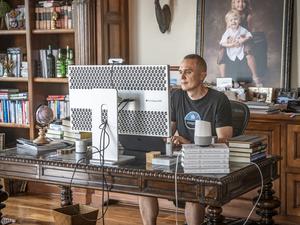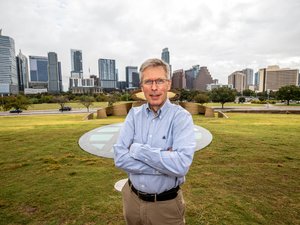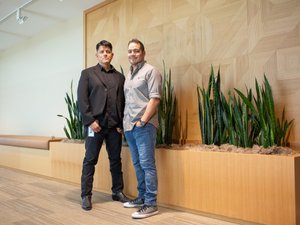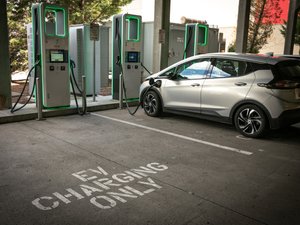
You are what you eat. At least that’s the thinking now, especially in Austin, as the farm-to-table movement continues to grow.
It’s exactly how Sam Eder, one of the founders of Big Wheelbarrow, felt when he bought a house in East Austin back in 2004. It just so happened that the house was around the corner from Springdale Farms.
“Finding myself in an urban farm in the middle of Austin really changed how I looked at food,” he said.
The living situation created a drastic change in his life. He changed how he fed himself, and even got involved in local government as part of a group that helped change urban farming ordinances in Austin.
Along the way, he met several chefs and farmers, and connected with Ben McConnell, an ex-consultant turned urban farmer. In meeting all these chefs through their urban farming, the two saw how much time their restaurant clients spent handling orders from small farms. They figured they could do something about it, and, earlier this year, Big Wheelbarrow was created as a better way to source from small, local farms.
The company started out originally with restaurants.
“We had various restaurants around Austin who would say 'hey, we need basil, squash, mustard greens,' and then we would go out and source them from small farms,” he said. “Depending on the fulfillment, we would fill the delivery. Back then, we would do delivery for a surcharge, and had a transaction fee attached to our marketplace for revenue streams.”
During this discovery phase Eder and McConnell found that what was more important than fulfillment in orders was that chefs needed food. And fast.
“We really want restaurants to reflect the communities they are a part of."
“The problem with small producers is that sometimes their crops can get lost in the shuffle when a restaurant is working with so many vendors,” Eder said.
With this in mind, Big Wheelbarrow pivoted in June to focus on larger wholesale buyers.
“With wholesale buyers, who do the buying for restaurant groups, as well as some retail outlets, the buying gets done more easily,” Eder said.
With the switch in market target also came a change in how Big Wheelbarrow did business.
A Bot to Connect Growers and Restaurants
In August, the founders debuted a new way to develop revenue, as well as a new tool to help buyers. Wholesalers now pay through a monthly subscription service, while having a bot with AI technology to help them source crops around Central Texas.
The bot has made buying easier for a lot of clients, as it talks to farmers all over the Central Texas region to figure out what crops farmers are growing and when they will be sold. Eder cites a particularly well-known farm-to-table Austin restaurant as an example.
“Lenoir has a standing order for certain cheeses and vegetables," Eder said. "The bot knows exactly what the restaurant is ordering and sources it from specific farms. Not only that, but the bot handles delivery via text from the farmer, pinging the orderer when the delivery is available for pickup.”
The bot manages more complex nuances. Take cilantro, for example. If a wholesaler wanted to buy cilantro, the bot would look to see where the closest cilantro farmers are, while also figuring out if the vendor bought from that particular farm before. Sometimes, the vendor could be right down the street.
“We really want restaurants to reflect the communities they are a part of,” he said.
In creating and maturing Big Wheelbarrow, Eder hopes to see a large scale shift in Austin that is happening in other places. As 92 percent of food we consume is purchased through wholesalers, Eder wants farm-to-table purchasing to increase among vendors.
“When wholesalers started out, they caught the old guard off guard,” he said. “There were totally new supply chain models, but the middle man could never figure out how to work with smaller farms -- and those farms already had razor-thin profit margins.”
Big Wheelbarrow has already seen some success.
Bee Tree Farms was able to consolidate their entire order through the company, while La Flaca, who supplies restaurants like Olamaie, Emmer and Rye and L’oca D’Oro, used the platform to sell completely to wholesalers, while also maintaining an expensive client list.
What’s next for McConnell and Eder?
With the food market constantly changing, there’s plenty of opportunity on the horizon.
Eder would love to see the bot offer advice to their clients for the future, like giving a client advice on the demand for a particular crop grown during a season, while also figuring out when certain crops might peak and tail during the year.
“Austin is an important market when it comes to urban agriculture,” Eder said. “By where Austin sits (between agricultural areas in West Texas, Mexico and the Midwest), we see things happen before bigger cities do.”
And that makes Big Wheelbarrow both a startup with social impact -- and one with potential to scale.
“We’re passionate about urban agriculture because making it sustainable has a ripple effect," Eder said. "It conserves green spaces, and changes the style of how we live. It’s all part of a larger cycle."







